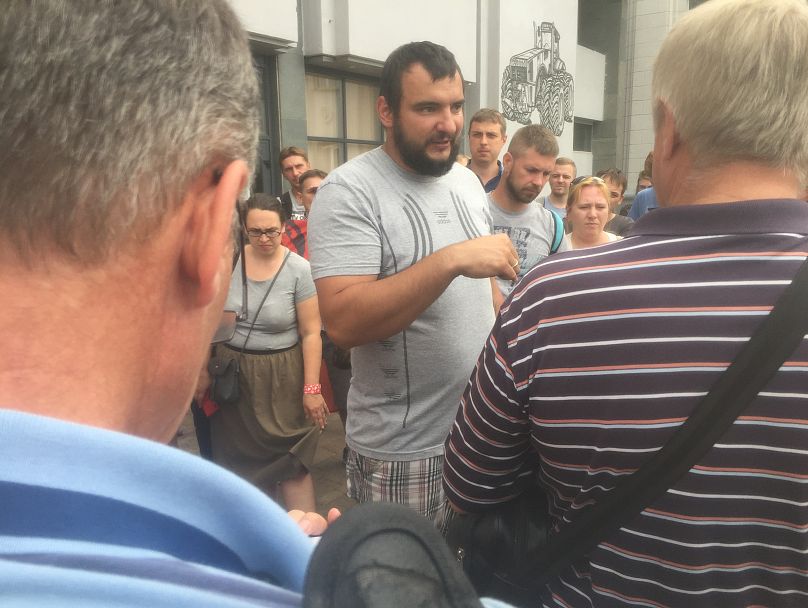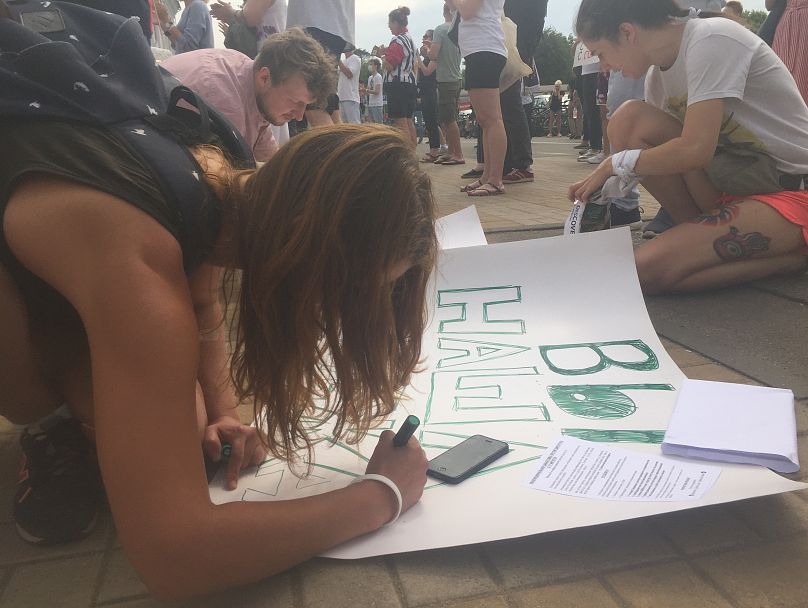Opposition demonstrators want employees at the state-owned Minsk Tractor Works to down tools in an effort to pressure President Alexander Lukashenko
Workers at a major tractor factory in Belarus halted a strike on Tuesday over fears they could be dismissed from their jobs.
 ADVERTISEMENT
ADVERTISEMENT
 ADVERTISEMENT
ADVERTISEMENT
The industrial action involving 15,000 employees at the Minsk Tractor Works was one of several at state-run plants across the country, as thousands of workers join nationwide protests against President Alexander Lukashenko.
But strike leader Sergei Dylevsky told Euronews that workers at the Minsk Tractor Works had been threatened on Tuesday morning with fines and potentially losing their jobs, and that their strike would therefore not go ahead.
"The fear in Belarusians is still under their skin. If the bosses and administration say that they cannot strike, it is tough to overcome this and still protest. It is in our blood," he said.
He added that he was disappointed that he was not able to convince people to strike: "We, as the organisers of the strike, are not afraid for ourselves.
"We don't care what happens to us, but we want to protect people. We want breadtakers, parents not to leave their children without food. That there has something to feed their children."
Opposition leader Sviatlana Tsikhanouskaya, who has refused to accept the result of the August 9 election in which Lukashenko received 80% of the vote, has created a Coordination Council that aims to oversee a peaceful transition of power.
Dylevsky told Euronews that he is in contact with Tsikhanouskaya’s team and that a fund for compensating workers who strike was already in place, but that it needed to be strengthened.
Inside the Minsk Tractor Works, only 250 out of the 15,000 employees were ready to go on strike if it meant losing their jobs, he said.
Several workers are now planning to apply for holiday leave and to file paperwork for an official strike, which would limit the risk of job losses at the factory.
Strikes: a possible powerful weapon
It is not yet clear whether the obstacles at Minsk Tractor Works are also being seen in other parts of Belarus, where more than 30 factories are said to be wholly or partly closed.
But diffused strikes could be a problem for the opposition and their aspiration of putting even more pressure on Lukashenko.
Franak Viacorka, a Non-Resident Fellow at the Atlantic Council, previously told Euronews that it was a combination of protests, strikes, and the "power transition" by Sviatlana Tsikhanouskaya that could "make this revolution plausible."
The Minsk Tractor Works was established in 1946 and became a symbol of Belarus, producing tractors for a large part of the Soviet Union.
Many opposition demonstrations came to the factory on Tuesday in a show of support for its workers and to convince them to strike.
"They are afraid of striking, and that is why we are here," said Alexander, 44, a demonstrator standing outside who did want to give his last name for fear of government reprisals.
"I can understand this fear. We have had 26 years of fear, of not talking the truth. They are afraid to be fired, afraid to be punished by the [Belarusian secret service] KGB.
“This is a major factory in our republic, and if they start striking, it will be very good. This is the largest state enterprise, and if state enterprises start to strike, it is going to break the system."
Other factories are ready to strike
Siarhei Antusevich, the vice-president of the Belarusian Congress of Democratic Trade Unions, told Euronews that more strikes would follow in the coming days.
It is essential that it happens, he said, because it is one of the best ways to pressure the government: “People saw that the majority did not vote for Lukashenko. His unwillingness to make concessions to people and admit defeat. It forces people to resort to such extreme measures as a strike.”
Another union leader, Lizaveta Merliak said strikes were on the way at Grodno Azot, a large factory around 250 kilometres outside of Minsk.
Workers at the plant, which produces ammonia, methanol, liquid carbon dioxide, and biodiesel, were discussing how to arrange strikes while ensuring workers were protected.
“Workers understand that the only way to weaken this illegal authority is to leave it without money,” said Merliak, who is international secretary of the BITU union.
“This money comes from the state enterprises. We stop the enterprises – we leave Lukashenko without money.”












